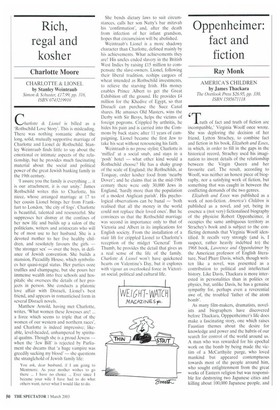Rich, regal and kosher
Charlotte Moore
CHARLOTTE & LIONEL by Stanley Weintraub
Simon dE Schuster, f17.99, pp. 316, ISBN 0743219910 C harlotte dc Lionel is billed as a 'Rothschild Love Story'. This is misleading. There was nothing romantic about the long, solid, mutually supportive marriage of Charlotte and Lionel de Rothschild. Stanley Weintraub finds little to say about the emotional or intimate aspects of the relationship, but he provides much fascinating material about the social and political power of the great Jewish banking family in the 19th century.
'1 assure you the family is everything ... it is our attachment, it is our unity.' James Rothschild writes this to Charlotte, his niece, whose arranged marriage at 17 to her cousin Lionel brings her from Frankfurt to London, 'the city of fogs'. Charlotte is beautiful, talented and resourceful. She suppresses her dismay at the confines of her new life and builds up a salon of the politicians, writers and aristocrats who will be of most use to her husband. She is a devoted mother to her five healthy chil
dren, and resolutely favours the girls 'the stronger sex' — over the boys, in defiance of Jewish convention. She builds a mansion, Piccadilly House, which symbolises her quasi-regal status. Her parties ooze truffles and champagne, but she pours her immense wealth into free schools and hospitals; she oversees the details of her projects in person. She conducts a platonic love affair with Disraeli, Lionel's best friend, and appears in romanticised form in several Disraeli novels.
Matthew Arnold, having met Charlotte, writes, 'What women these Jewesses are! ... a force which seems to triple that of the women of our western and northern races', and Charlotte is indeed impressive; likeable, level-headed, unhampered by spiritual qualms. Though she is a proud Jewess when the 'Jew Bill' is rejected by Parliament she dreams that 'a huge vampire was greedily sucking my blood' — she questions the stranglehold of Jewish family life:
You ask, dear husband, if I am going to Mentmore. As your mother wishes to go there ... I have no choice ... Ever since I became your wife I have had to do what others want, never what I would like to do.
She bends dietary laws to suit circumstances, calls her son Natty's bar mitzvah his 'confirmation', and, after the death from infection of her infant grandson, hopes that circumcision will be abolished.
Weintraub's Lionel is a more shadowy character than Charlotte, defined mainly by his achievements. What achievements they are! His uncles ended slavery in the British West Indies by raising £15 million to compensate the slave-owners. Lionel, following their liberal tradition, reships cargoes of wheat intended as Rothschild investments, to relieve the starving Irish. His money enables Prince Albert to get the Great Exhibition off the ground. He provides £4 million for the Khedive of Egypt, so that Disraeli can purchase the Suez Canal shares. He amasses Old Masters, wins the Derby with Sir Bevys, helps the victims of foreign pogroms. Crippled by arthritis, he hides his pain and is carried into the Commons by back stairs; after 11 years of campaigning, Lionel became the first Jew to take his seat without renouncing his faith.
Weintraub is no prose stylist; Charlotte is 'miffed' at a social snub, and stays in a 'posh' hotel — what other kind would a Rothschild choose? He has a shaky grasp of the scale of England; the Rothschilds, at Torquay, order kosher food from 'nearby Dover'; and he claims that in the mid-19th century there were only 30,000 Jews in England, 'hardly more than the population of a modest Anglican parish'. His psychological observations can be banal — 'both realised that all the money in the world could not replace their loved ones'. But he convinces us that the Rothschild marriage was second in importance only to that of Victoria and Albert in its implications for English society. From the installation of a stair lift for crippled Lionel to Charlotte's reception of the midget 'General' Tom Thumb, he provides the detail that gives us a real sense of the life of the family. Charlotte & Lionel won't have quickened hearts on Valentine's Day, but it explores with vigour an overlooked force in Victorian social, political and cultural life.


















































































 Previous page
Previous page